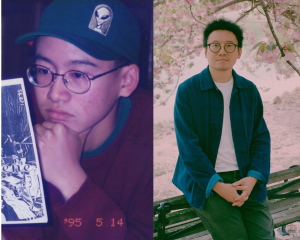Bittersweet, sentimental, and indispensable: An ode to the Oxford comma
Graphic Illustration by Kavya Iyer
With each sentence I write from here on out, I am reminded to cherish every moment, be honest with myself, and appreciate my own individuality — one Oxford comma at a time.
May 27, 2021
An Oxford comma is the comma used after the penultimate item in a list of three or more items. Some argue that it’s unnecessary. I strongly disagree. Each Oxford comma I write is inevitably accompanied by a coy smile and the gentle flutter of butterflies in my stomach. One could probably go so far as to say that I have a little crush. On a grammatical device. Yes, you read that right.
I can always count on that one tap of my keyboard, or that one pencil stroke, to make my day a little bit brighter. But despite my strong feelings for this miniscule grammatical weapon, I’ve gone without harnessing its power my past three years on the staff of the Epic. Why? Because according to Associated Press Style, the set of conventions used in journalism, they’re banned. With every story I wrote, I felt a familiar twinge in my gut as I retraced my words and deleted the commas. Still, I never stopped to question why we didn’t use them; I simply accepted it as a fact.
My intense love for Oxford commas is somewhat odd, but I would argue that my blind decision to conform to an arbitrary rule is even odder. Oxford commas were a consistent presence in my life until I joined the Epic, and the discomfort I felt at losing such a seemingly insignificant thing made me recognize how much other discomfort I’d been holding in for so long by not staying true to myself. Upon reflecting on the last four years, I’ve realized just how much time I wasted trying to fit in, trying to please certain groups of people. Time is precious. As I move on to the next stage of my life, I don’t want to lose another moment being someone who isn’t authentically me. So I’m starting right now by using Oxford commas in the last words I write as part of the Epic.
Much of my love for Oxford commas stems from the sentimental value they have for me. They taught me to live in the moment and to appreciate every second — something that I’ve especially realized the importance of this past year.
A global pandemic brought our journey on campus to a premature end. The senior class missed out on so many events that make up a “typical” high school experience — both proms, our senior homecoming, and a traditional graduation. During this past year, I found myself longing for the most mundane events that would have happened during in-person school. Whether it be getting new assigned seats, cramming for tests, and bonding over failed labs; or eating lunch with my friends, walking in circles around campus, and laughing until our stomachs were in stitches. Now that it’s all gone, I realize how much I took for granted. Yes, this experience sucked, but it also taught me to appreciate the little things in life, like my treasured Oxford commas. Often, the smallest things are the most meaningful.
That isn’t to say I detested my time alone. Being so isolated for so long forced me to become comfortable in my own mind, body, and identity, something that sounds so simple, but was so hard for me to genuinely accept. This isolation also separated me from the sea of faces I had for so long tried to hide in. With almost 550 students, the Class of 2021 was a formidable size, making my attempts to blend in extremely easy. For so long, I had used my sociable reputation as an excuse for my ease of fitting in. Now that I was forced to be alone, I realized that I hadn’t really been fitting in; I had been more worried about standing out. I didn’t want to be the last item in a list, separated by a comma. I wanted to be grouped in with the rest.
When I moved here in seventh grade, I was so worried about not fitting in that in order to do so, I lost a part of myself. I laughed at jokes I didn’t fully understand, I dressed the way everyone around me did, and I acted a certain way to ensure I was not left behind in this new environment. Looking back, I now realize how short-sighted that was because even after all that, I didn’t feel like I truly belonged. The impression I left on others was not an accurate representation of myself, so I wasn’t comfortable around some of the people I attracted. I always felt the need to prove myself, whether that was through my words, behavior, or interests, in order to be “worthy” of their company. As a result, I’ve bounced between friend groups for the majority of my time here.
I’ve always put my self-worth in the hands of my peers. Their opinions of me determined my opinion of myself — a hard realization I had after being alone with so much time for self-reflection. Even when writing articles for the Epic, it took me so long to find my voice because I was so worried about my peers’ reactions to my writing. Each Oxford comma I deleted represented me stifling my personality within the constraints of how I conditioned myself to behave.
I became a generic cardboard cutout of the “stereotypical high school student.” I was doing decently well in classes, I had a social life, and I was actively involved in school events. That was all my personality entailed; nothing really set me apart. I thought I was happy with who I was, but I wasn’t. I was simply comfortable in my invisibility.
However, with so much time by myself, the isolation that I so deeply feared became the reason I was forced to find myself. I had nobody else to talk to, so I was forced to talk to myself. The inevitable self-reflection that came with that isolation allowed me to become someone that I’m genuinely proud of. I’ve developed my own sense of style, become more confident in my body, and come to understand my own moral and political beliefs. I’ve also strengthened many existing relationships and developed meaningful new ones by being open, honest, and real with others. For the first time in the five years I’ve lived here, I feel truly content.
So now, I return to my beloved Oxford commas, a visual representation of how far I’ve come, how much I’ve learned, and how much I’ve changed. Although I don’t know what the future has in store for me, I know that I will be present, engaged, and motivated to discover myself further. And with each sentence I write from here on out, I am reminded to cherish every moment, be honest with myself, and appreciate my own individuality — one Oxford comma at a time.




























































